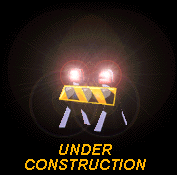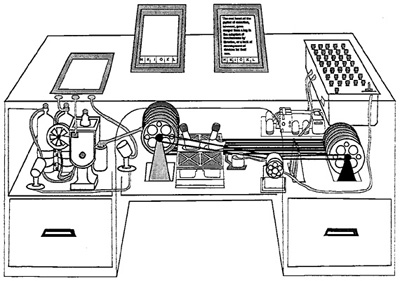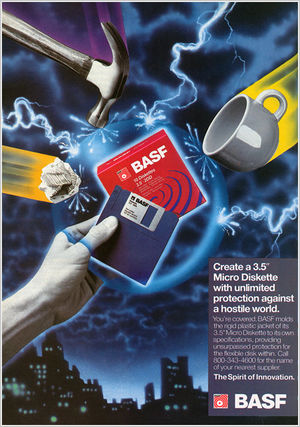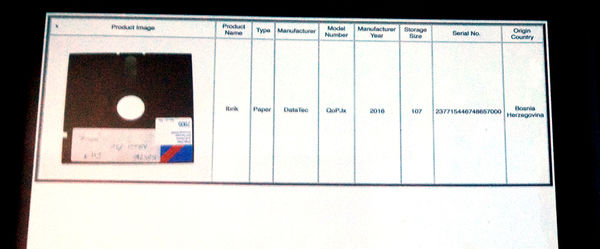User:ThomasW/First Proposal Outline v2
Old version that got to messy, look for older versions Old

Ideas, thoughts, WTFDIGM
- Formats: How does the formats dictated your making, collecting,curating memory's?
- If there was a issue with papyrus and paper, what makes bit root +++ different?
- Do people care and what happens with the fait in the utopic power of tech when they fail for people?
- Why do I care?
- Memory is not history
- media not stable
- Does and don’t
- curiosity cabinet
- intro.. new or old storage mediums. Pick
- encyclopedia of storage mediums
- make info access to everyone.
- what to save means
Thesis things
- How does the 2 and 3 law of Thermodynamic relate to storing of information? ++++
- (Mass production of memory, make things more or less valubal?)
Project tittle ideas
- Knowledge on the edge of oblivion
- My memory died
- My ____ died
- 404 not found
- and more

"Constant on the edge of oblivion 12.11.15 "
For my graduation project at Piet Zwart Institute I want to question the Utopic view that any given information storage medium is the final solution too our storage problems, by the fact that nothing stays permanent, and have never been. Since the beginning of history there have always been great promises for the future of information storage, But history tells us different. I want to explore this question by making collection of work that tells the experience from the peoples individual level on storage mediums after they fail. How did this change their relationship to the mediums? My work will explore different current and past storage mediums like Hard-Drives, USB Sticks, CDs, floppy disks and online “cloud” storage. My finished part of the project “My Hard-Drive Died” explores peoples relationship to their hard-drives by transmitting stories true a modified hard-drive. “We have the capacity to store everything for possible recall, but these same extended memory technologies are capable of generating oblivion in other ways—not least of which is through the technology.” (Gabrys, 2007, p120-123 )“
Introduction
Today we are often promised instant relocation, storage for free. But nothing is free and how does this effect our connection to what we produce? And how does its supposed “easy life” makes us think on the value of what we make and store? My interest in the topic of finding and spread information and knowledge started really early, since I raiding the school library at the age of nine for technology and history books. Later it made me make a computer video game magazine when I was 13 years old. Collection images, writing reviews. I had folders of images and text and project files. But even how careful I saved them, moving them around from computers to floppy disks to other computers, it all got lost somewhere, stuck on old drives, broken floppy disks, or maybe I myself deleted them thinking they had no future value...
Now its not computer games, but history itself that is in danger, we put information onto platforms that says it will archive for ever, “they tell its safe and saved, you don’t need to think about it” but history tells us that platforms and formats never stays forever. From papyrus or the next “cloud” services, they all will disappear. “Your data maybe safe for tomorrow, but what about a 50 or 100 years from now? And is it really that important? “Digital is the paradigm for content and quantity of information; analogue is the paradigm for usability and interfacing.” (Ludovico,2013,p151) Printed books can last hundreds of years if they are not exposed to fire, water, war and the stupidity of man, but a digital text can disappear and be left unaccessible in the future on the reasons like, unsupported file formats, dead storage media or defunct “cloud” services or new “End User Licenses Agreements” that deny you to the right to save or delete your own information. Online platform or “the cloud” are now often put forward as a final solution for your storage problems, but not even they can guaranty that they still be in business in one months time or what about 100 years from now? By using the “cloud” as a metaphor it makes it even harder for most people to understand what “the cloud” really is, that is in reality traditional computer storage on devices, but just on other peoples machines, somewhere in the world in big buildings. But by looking back at history, no format have truthfully been been everlasting without a constant supervision and copying of its content over to new formats. But by being more aware how things work and being the one that decides whats stays and what gets deleted you can control what what to keep or what to deleted. “paper was introduced during the ninth or tenth centuries, and the first paper found there is of the oriental type (called bombykinon or bambakeron). The fact that is was cheap than and other material gradually gave it ascendancy, but its rapid deterioration was a matter of great concern to the monks” (Fernando, 2008, p95)
Relation to previous practice
'“It must be understood that as long as art stand aside from the problems of life it will only interest a very few people.” (Munari,1966, p25) During my Bachelor I made a project called “The Library of Babel” based on the short story by the same name by the Argentinian author Jorge Luis Borges. This project was made on the topic of “bit-rot” in text documents. This project got me really interesting in the long term storage of information and how we as society deal with it. A tread that go true my previous projects are always topics that I find interesting, but never get the attention it deservers
 “The Library of Babel”
“The Library of Babel”
In my previous term at Piet Zwart I made the project Imagery Storage Media [Imagery Storage Media] Since the turn of the century with invention of electronic storage devices there have been a lot of promises of the durability of the medium from their inventors. The computer industry is 50 years of over promising and under-delivery. If the computer industry can make hyper bull, why not make up my own collection of storage formats? With my random generating encyclopaedia of imagery storage formats I wanted to make fun of the computer industry and putting a question out to people, If the new formats are so good and as stable as they say they are, can you really believe them?
Relation to a larger context
'“In 1961, the British science fiction author Arthur C. Clarke suggested that “any sufficiently advanced technology is indistinguishable from magic.” (Feigelfeld, 2015, Online)“
 Vannevar Bush’s Memex machine.
Vannevar Bush’s Memex machine.
Technology is becoming more distant from the peoples understanding of it, the first to start using a technology know more about how it works than those who become acquainted later. Most computer and computer storage technology’s are mysterious. Its hidden away in black boxes, warning labels and security screws and hyper-bull marketing words tell you that This is the final and last thing you will ever need. The technology industry have always been “fetishising the notion of optimization” From paper medium to the cloud, People have always been looking for quick solutions for their problems, storing their memory is one of them. Rather than getting caught up in speed, then, we must analyze, as we try to grasp a present that is always degenerating, the ways in which ephemerality is made to endure. What is surprising is not that digital media fades but rather that it stays at all and that we stay transfixed by our screens as its ephemerality endures. (Hui Kyong Chun, 2008, p171 )
Thesis intention
The thesis will focus on the topic of society and how we deal with this increasing amount of information. “I am afraid that future theorists and historians of computer media will be left with not much more than the equivalents of the newspaper reports and film programs from cinema first decade. They will find that analytical texts from our area recognize the significance of computers take over of culture, yet, by and large, contains speculations about the future rather then a record and theory of the present. (Manovich,2001, p6-7)“
Practical steps
My work will explore different current and past storage mediums like Hard-Drives, USB thumb drives, CDs, floppy disks and online “the cloud” storage. The Hard-Drive part of the project exist now as a prototype in the form of “My Hard Drive Died” where I transmit 750 stories gathers from twitter true one old drive that is reworked as a speaker. The voice is done with an synthesizers voice as it make it more as a voice from the hard-drive. As the rest of project I need to explore different directions on where the project can go, On the USB part there have been issue with people buying “fake” USB stick that show a bigger capacity then in it got, so exploring peoples frustration with faulty tech. “The design artefact you leave behind will be your ultimate legacy" (Beirut ,2006, p6)
Bibliography
- Gabrys, Jennifer (2007) DIGITAL RUBBISH a natural history of electronics, Paperback , United States of America ,The University of Michigan Press
- Ludovico, Alessandro (2013) Post Digital Print, Onomatopee
- Munari, Bruno, Design as Art (1966) England, Penguin
- Feigelfeld, Paul (2015) Media Archaeology Out of Nature: An Interview with Jussi Parikka, e-flux.com [Online] Available: http://www.e-flux.com/journal/media-archaeology-out-of-nature-an-interview-with-jussi-parikka/ (Accessed:28.05.2015)
- Beirut, Michael, Drenttel, William, William, Steven (2006) Look Closer Five, Critical Writings on Graphic Design, New York, Allworth Press
- Manovich, Lev, (2001) The Language of New Media, United States of America, The MIT Press
- Baez, Fernando (2008) A Universal History of the Destruction of Books: From Ancient Sumer to Modern-day Iraq, Atlas & Co.
- The Enduring Ephemeral, or the Future Is a Memory Author(s): By Wendy Hui Kyong Chun Source: Critical Inquiry, Vol. 35, No. 1 (Autumn 2008), pp. 148-171 Published by: The University of Chicago Press Stable URL: http://www.jstor.org/stable/10.1086/595632 . Accessed: 22/09/2015 09:06


